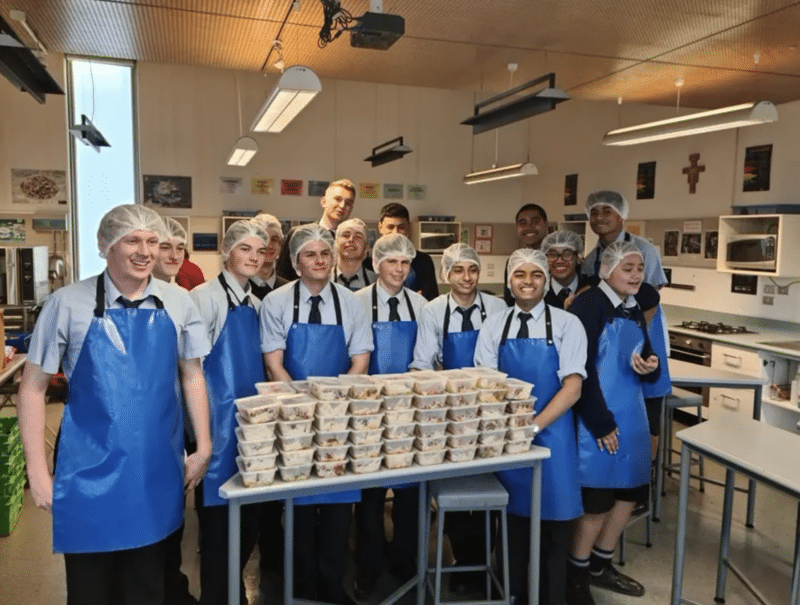By MINA AMSO
The leaders of the Vinnies (Society of St Vincent de Paul) in Auckland are gearing up for 2024, which they anticipate will be a momentous year for them.
The general manager for the Vinnies Tamaki Makaurau hub in Onehunga, Delphina Soti, said that the Young Vinnies Programme typically attracts between 500 and 1600 secondary students annually. This year’s participation is expected to hit north of 1600.
“Over the past three years, nearly 4000 secondary students from approximately 17 different schools, mainly Catholic, have engaged in the programme,” said Ms Soti.
According to Ms Soti, students describe the experience as “eye-opening”. They choose areas of focus such as food insecurity, poverty, or homelessness, with opportunities to visit SVDP hubs and engage with social services in the community to gain first-hand experience.
“They didn’t understand the cause and effect of poverty, or understand that there are a lot of people who are food-insecure, [and] so many homeless. We have a lot of people who have never experienced the cost of living [crisis] before.
“Packing as simple as a sugar bag, they ask ‘why are we packing sugar? Do they not have sugar?’”
In fact, one in five children in New Zealand live with food insecurity, said Ms Soti.
According to the Growing Up in New Zealand website, children living in households with moderate to severe food insecurity are less likely to receive the nutrition they need for healthy development. (Growing Up in New Zealand is this country’s largest longitudinal study of child health and well-being, following the lives of more than 6000 children and their families. The University of Auckland study has been following the lives of these children since 2009 and 2010 – before they were born.)
“Compared to children in food-secure households, children with food insecurity have lower fruit and vegetable intake, are less likely to eat breakfast at home before school, and have more fast food and more fizzy drinks because these are cheap, filling alternatives,” a report from Growing Up in New Zealand stated.
Food insecurity is related to low disposable household income and material deprivation. It is being used as an indicator to monitor progress, in line with the Child Poverty Reduction Act.
There is a downward trend since 2012/13 in the proportion of children living in households where food runs out often or sometimes.
Some of the participants in the youth programme in recent years have sought support for well-being and mental health, Ms Soti said.
This was especially the case for some young adults and school leaders, notably during the Covid pandemic years, she said.
There has been a real need to engage with these young people, who had been enduring isolation, the pressures of studying remotely, and who experienced the grief of not being able to complete final school year events with classmates and friends. Students also had to juggle studies and employment to assist their families at this time.
After the Covid restrictions ended, Vinnies has been helping young people attend youth evenings by providing support vouchers for transport. Food support has also been given during and after the Covid years.
Ms Soti said that there was a need to help young people “de-stress”. So, it was important for Vinnies to create gatherings involving fun activities, and centred around supporting mental health, helping well-being, safeguarding, and positive socialisation.
“We also brought in some mental health, psychotherapist, [and] social worker practitioners and mentors, to support students one-on-one and in group sessions,” Ms Soti said.
Young people involved with Vinnies also carried out advocacy work on issues that they were concerned about at their schools.
The Vinnies student programmes cover various social justice and awareness themes throughout the year, including social exclusion, diversity, and homelessness. For the homelessness programmes, the Vinnies work with Auckland City Mission staff to facilitate overnight retreats, giving students first-hand experiences and perspectives.
Ms Soti said that the Vinnies Youth Programme is about putting faith into action, providing opportunities for spiritual exploration, understanding, empathy, and advocacy. It serves as a safe space for young people to connect, grow, and find belonging.
The students look forward to meeting students from other schools, said Ms Soti. In fact, it became more apparent following the pandemic that more students were enjoying the socialising aspect of the programme after feeling isolated at home.
This prompted some tweaking of the programme so as to meet the needs of the young people. She also noted that community volunteering and well-being programmes attract many other groups.
“Throughout the year we have all sorts of communities come through, this includes, and are not limited to, corporate groups, businesses, families, clubs and sports groups, university teams, parish and youth groups and school staff.
“The other week we had the entire staff of McAuley High School, who volunteered for half of their working day. As part of this community volunteer programme, we always start in karakia (prayer), and integrate whakawhanaungatanga (relationship building), and manaakitanga (hospitality).”
These programmes are run by the Vinnies management team, warehouse staff, and youth workers, and offer various activities and reflection opportunities, concluding with the breaking of bread together in a communal lunch whipped up by the Vinnies chef and cooks.
The Vinnies Youth Programme engages with colleges, both Catholic and non-Catholic, offering programmes centred around service, charism, faith, and leadership.
This year’s activities started with a leadership session in late February [Youth Leadership Programme], at which some 70 leaders from the 17 colleges in Auckland diocese gathered. The leaders will attend a training camp, and later be commissioned for the year at a Mass celebrated at St Patrick’s Cathedral. These leaders then lead their Young Vinnies cohort at their colleges in their service activity for the year.
Beyond the Young Vinnies Programme, Vinnies centres throughout Auckland offer a wide range of social services, including Op Shops, social enterprise initiatives, food banks, budgeting services, well-being programmes, community connections, and mentoring.

Reader Interactions